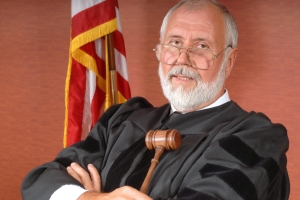My friends laughed hysterically when I had jury duty last year. Apparently, the idea of a lawyer having to do his civic duty is funny. And yes, for the record, I did wear my bow tie.
During the jury selection process, my exchanged with the judge went as follows:
 Judge: Sir, what is your career?
Judge: Sir, what is your career?
Bow Tie: I am a lawyer, your Honor.
Judge: I had a feeling.
I was told by one of the other dismissed jurors that both the prosecutor and defense counsel were shaking their heads “no” the entire time I was answering the Judge’s questions on technology in the courtroom, e-Discovery and my job experience. The Prosecutor apparently did not like the fact I did a little criminal defense at the beginning of my career and I was promptly thanked for my service.
Litigation support software, trial presentation technology and Web 2.0 are not just impacting how we practice law today, but jury selection as well. There is even a specialty industry forming in jury research that checks jurors’ Facebook and MySpace pages to learn more about those jurors. [1]
There have also been attempts to dismiss jurors for their blogging. In Gregoire v. City of Oak Harbor, 2007 Wash. App. LEXIS 2929 ( Wash. Ct. App. Oct. 29, 2007 ), an attorney tried to excuse a juror for a blog. The attorney discovered a blog written by a juror, in which the juror blogged about his experiences dealing with suicide in his job as a youth minister.
During jury deliberations, trial counsel brought the blog to the trial court’s attention and asked that the juror be excused, arguing that the blog was inconsistent with the juror’s questionnaire. The juror-blogger had answered “no” to the question regarding whether he had ever been depressed or suicidal.
The trial court found that the blog comments regarding the juror’s encounters with suicide in his work as a youth minister were not inconsistent with the juror’s questionnaire. Moreover, the blog did not show any bias, thus a challenge for cause would have been inappropriate.[2]
Attorneys would serve their clients well by asking prospective jurors if their blogging practices relate to any issues of the lawsuit during voir dire. A juror’s activity on Web 2.0 might be totally harmless and not relevant to the lawsuit, but it never hurts to ask.
[1] Julie Kay, Social Networking Sites Help Vet Jurors, The National Law Journal, August 13, 2008, http://www.law.com/jsp/legaltechnology/pubArticleLT.jsp?id=1202423725315
[2] Gregoire v. City of Oak Harbor, 2007 Wash. App. LEXIS 2929 ( Wash. Ct. App. Oct. 29, 2007 ),

I can’t help it, I find this fascinating. As well as the newer article where lawyers can’t believe jurors use the Web. LOL… great stuff.